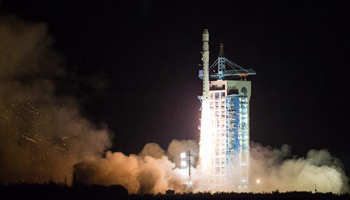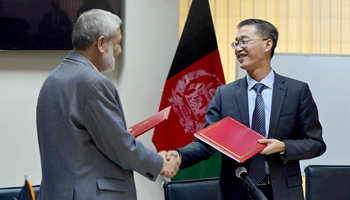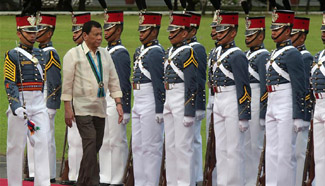 Photo taken on Aug. 9, 2011 shows the building of the Federal Reserve in Washington, the United States. The Federal Open Market Committee of the Federal Reserve announced that it would shift $400 billion in its shorter-term debt portfolio holdings to longer-term bonds hoping to stimulate more growth. (Xinhua/Zhang Jun) |
by Jing Minmin, Xiong Ping
BEIJING, Dec. 22 (Xinhua) -- Facing a string of contingencies in 2016 and huge uncertainties in 2017, the U.S. Federal Reserve staunchly hoisted its benchmark interest rate amid contradictory policies.
The Fed decision on a rate hike not only impacts the U.S. economy, but may also lead to multiple hazes over the world, and cloud the global economy next year.
The Fed last week decided to raise the benchmark interest rate by 25 basis points, the only rate hike in 2016, with three more expected in 2017.
The Fed cited the U.S. economic recovery, sufficient employment, and soaring financial markets, among others, to defend what it called "a reasonable move". But this move may not generate a "reasonable" spillover effect for other parts of the world.
First, the Fed's monetary policy and the U.S. President-elect Donald Trump's economic vision, or "Trump economics", have turned to be highly irreconcilable.
The Fed's rate hike orientation will surely boost the U.S. dollar, which is already standing at a 14-year high, while the stronger dollar will expand the U.S. trade deficit, dilute the overseas profits of U.S. enterprises, raise commodity prices, and add to the cost of living for the working class.
Trump had pledged during the election campaign to reduce the trade deficit and improve the conditions of blue collar workers.
Meanwhile, Trump advocates increasing fiscal expenditures and speeding up infrastructure construction, which might overheat the U.S.economy and thus spur the Fed speed up its rate hike paces, in turn appreciating the dollar further.
That will eventually deteriorate the unbalance of the U.S. economy.
Second, the Fed's move to raise the rate combined with a strong dollar will increase the risk of a trade war, as the next U.S. administration might resort to protectionism to pursue more benefits for U.S. importers.
In addition, a strong dollar will choke Trump's wish to lure back jobs in the manufacturing sector to the United States, as the strong dollar means high production cost for businesses.
British newspaper The Financial Times quoted a senior European trade official as saying that the appreciation of the dollar might be the beginning of a trade war.
According to a recent survey by Reuters, the slowdown in global trade may become worse.
Against this background, if there were a trade war between major economies, it would deal a heavy blow to a flagging global economy.
Third, the Fed's rate hike will trigger capital flows out of emerging markets, especially those heavily relying on external funding.
Historically, every time when dollars return to the United States, the world economy is hit gravely, analysts said.
The rate hike has triggered the exodus of investment and foreign exchanges from developing countries and emerging markets, which will lift these countries' interest rates, reduce their dollar debt repayment capability, and even cause financial, political and foreign exchange disturbances in these countries.
Moreover, the Fed's move to strengthen the dollar highlights the incoordination of global monetary policy. After the Fed raised the rate, the central banks in countries like Britain, Switzerland, Norway, South Korea and Indonesia announced that they will keep their interest rates unchanged, while India and Brazil were expected to further ease their monetary policies.
For the global economy in 2017, U.S. monetary policy has become a major risk, which has periodically affected other economies in the world since 2008 when the global financial crisis broke out.
How to cope with this risk will test the wisdom of global policy makers.











